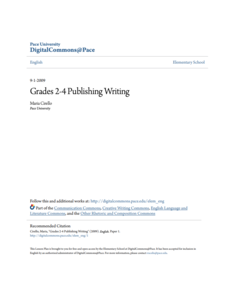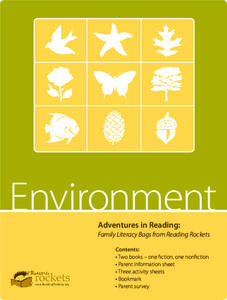Echoes & Reflections
The Children and Legacies Beyond the Holocaust
Using video testimony, primary source documents that detail international agreements, and structured discussions, learners consider the precarious position of children during the Holocaust and other international conflicts, and how to...
Pace University
Publishing Writing
Scholars become familiar with tagline literature with the help of the story, Alexander and the Horrible, No Good, Very Bad, Terrible Day by Judith Viort. After a read-aloud and whole-class discussion, leveled groups complete...
Guam Community College
Joseph Had a Little Overcoat
Spruce up a class reading of the children's book Joseph Had a Little Overcoat by Simms Taback with this fun series of activities. Starting with a list of reading comprehension questions and key vocabulary to address during a teacher...
Live Oak Media
Activity Guide: Joseph Had a Little Overcoat
Enhance a reading of the Caldecott Medal-winning children's book Joseph had a Little Overcoat by Simms Taback with this collection of learning activities. Starting with general background information about the book and author,...
PBS
Reading Adventure Pack: Environment
A fiction and nonfiction text, The Great Kapok Tree: A Tale of the Amazon Rain Forest by Lynne Cherry and I See a Kookaburra! Discovering Animal Habitats Around the World by Steve Jenkins and Robin Page begins a learning experience in...
Scholastic
Frindle Lesson Plan
"Who says a pen has to be called a pen? Why not call it a frindle?" Inspired by this quote from the award-winning novel written by Andrew Celements, this lesson allows children to invent their own...
National Council of Teachers of Mathematics
Stitching Quilts into Coordinate Geometry
Who knew quilting would be so mathematical? Introduce linear equations and graphing while working with the lines of pre-designed quilts. Use the parts of the design to calculate the slope of the linear segments. The project...
Echoes & Reflections
Rescuers and Non-Jewish Resistance
What does it mean to be a rescuer during the time of the Holocaust? Learners consider the role of those who resisted the Nazi invasions, including hiding Jewish people, throughout Europe. Activities include listening to the testimony of...
Echoes & Reflections
Studying The Holocaust
While many young scholars are familiar with the Holocaust, they may not understand the specific history that led to the unprecedented atrocity. The first lesson in the unit helps teachers gauge their pupils' background knowledge. A...
Echoes & Reflections
Survivors and Liberators
The end was just the beginning. The period immediately after the end of World War II and the Holocaust is often called "The Return to Life" as survivors looked to reunite and recreate broken families and shattered lives. A two-lesson...
Echoes & Reflections
Nazi Germany
The Holocaust was an evolution of anti-Semitism, scapegoating, and targeted violence against Jews with Nazi policies. A resource unpacks the escalation in violence, along with the erosion of democratic institutions, during the 1930s....
Echoes & Reflections
Jewish Resistance
Resistance to the Holocaust took on many forms. Learners explore the passive and active resistance of Jewish people who continued their practices and observances, as well as organized resistance against the evils of the Nazis. An...
Echoes & Reflections
Perpetrators, Collaborators, and Bystanders
After the Holocaust, the world grappled with how to bring justice to the Nazis. But what to do with the thousands—if not millions—who allowed it to happen? Young historians consider the issues of guilt, collaboration, and responsibility...












